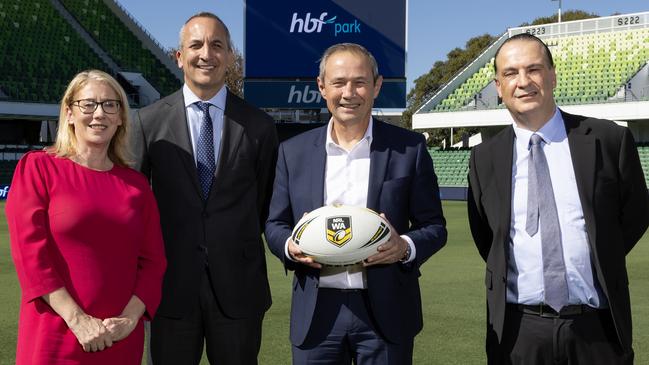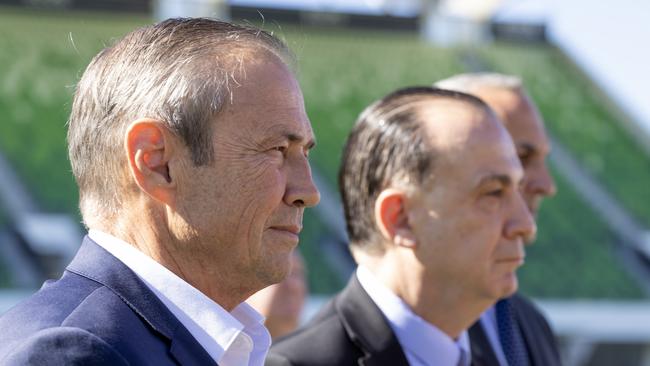Roger Cook’s recipe to end Bears hibernation hard to swallow for other codes
The Cook government’s decision to pump at least $65m into supporting a Perth-based rugby league franchise has raised eyebrows in other sporting codes.

The Cook government’s decision to pump at least $65m into supporting a Perth-based rugby league franchise has raised eyebrows in other sporting codes.
West Australian Premier Roger Cook – a self-confessed rugby league tragic – joined NRL boss Peter V’landys on Thursday to confirm that the Perth Bears would join the competition from 2027.
The state will commit $65m to support the team, not including amounts already spent on upgrading Perth’s main rectangular stadium, HBF Park. Some $35m of that will be directed to grassroots programs in WA.
The taxpayer contribution angered the former owner of the A-League side Perth Glory, Tony Sage, who said he had been unable to secure any government support for either the Glory, when he was struggling to keep it afloat, or his own previous proposal for a Perth-based rugby league team.
Mr Sage handed back the Glory licence in 2023 after he pumped an estimated $150m into keeping the club afloat.
It was placed into receivership soon after.
The club’s collapse followed the impact of both Covid and the loss of its home ground for a season while HBF Park was upgraded. The Glory had to play out of a suburban amateur soccer ground instead, and Mr Sage has long argued that the state government reneged on a promise to compensate it for the associated $5m loss.
Mr Sage said the government support for rugby league made him “angry”, given the same state government’s lack of support for the Glory.
In contrast to the Bears deal, the state government had actually made money out of the Glory through transport fees and stadium rental fees.
“It’s extremely hard to swallow,” Mr Sage said. “It’s only in the last, what, two years since Cook has been in control because (predecessor Mark) McGowan had no interest in rugby league. It is just Cook, this is his baby.”
He said the state had offered no help for his bid to establish a rugby league franchise, the Quokkas, which would have shared on- and off-field infrastructure with the Glory.
Unlike the Bears, Mr Sage’s proposal, which was ultimately knocked back by the NRL, did not rely on taxpayer funding.
“At the time there was no government support for us, zero, so I had to do it all off my bat,” he said.
Representatives of multiple other sporting codes across WA expressed astonishment at the scale of the government’s funding for community-level rugby league.
A senior member of one major WA sporting organisation, who did not want to be named, said the $35m in grassroots funding for rugby league was “an astounding number” that dwarfed the state government’s entire contribution to the grassroots of all other sporting codes. He said the government’s total pool of grassroots funding totalled just $4m a year.
WA Treasurer Rita Saffioti defended the funding commitment, noting the state had made major contributions to building new facilities for a host of sports including Australian rules, soccer, rugby union, hockey, basketball, netball and tennis.
The deal followed months of negotiations between WA and the NRL, and reports on the east coast that WA would have to stump up more than $200m to secure the side.
Mr V’landys, who denied ever leaking details of negotiations, said WA would be a “goldmine” for the NRL. “What the Premier has done is … a magnificent deal for the economy of WA, but at the same time, naturally, rugby league will benefit,” he said.

While the deal between WA and the NRL did not include any commitment for works at the HBF Park stadium, Mr V’Landys made it clear he expected to see the WA government stump up for an improved facility.
“We certainly want an upgrade to the stadium and I think that will happen,” he said. “The government’s got to pay for it because it’s going to get the return on investment.”
Mr V’landys hit out at some local news coverage of the deal. “I think the media coverage has been a bit biased in the sense that the main newspaper here is owned by Seven West Media that has the AFL rights,” he said.
“Let’s be quite frank. They don’t want us to be here because they realise we’re going to be competitive and we’re going to take some of their lunch. And we eat a lot.”
The Bears are expected to share a new high-performance centre with Andrew Forrest’s Western Force rugby union team, and Mr V’landys raised the prospect of the two sides sharing players. “There’s an opportunity here that may never have been done anywhere in the world where the two teams could be combined to a certain degree and can use each other’s players in specific matches,” he said.
A spokesman for the Western Force welcomed the new club and indicated they were willing to explore sharing resources. The Force also said it wanted to see grassroots rugby union – in particular juniors’ and women’s games – supported in a comparable way to rugby league.
Mr Cook pledged to release further economic modelling on the deal after his office initially released a single-page document justifying the commitment.
Opposition Leader Basil Zempilas said while it was “absolutely magnificent” to see a Perth-based NRL team, he was concerned over the adequacy of government disclosures around the deal.
“I do have some questions around the transparency, and it doesn’t appear to me that we have been given the transparency on this deal we were promised,” he said. “I’m not sure about all of you, but a one-page document does not appear to me to be full transparency on this financial arrangement we were promised.”




To join the conversation, please log in. Don't have an account? Register
Join the conversation, you are commenting as Logout